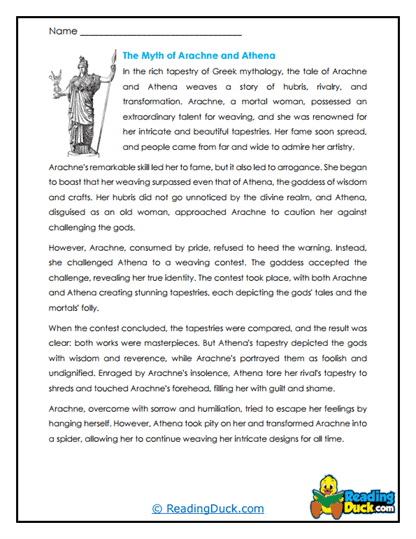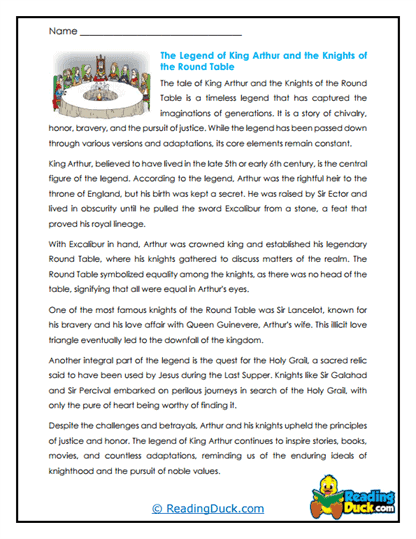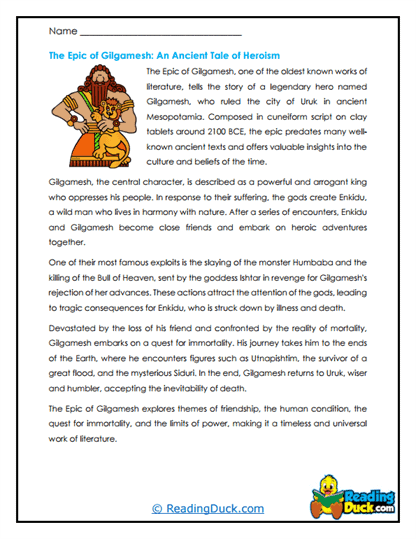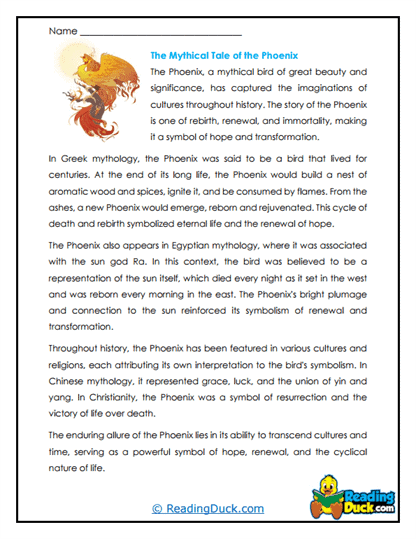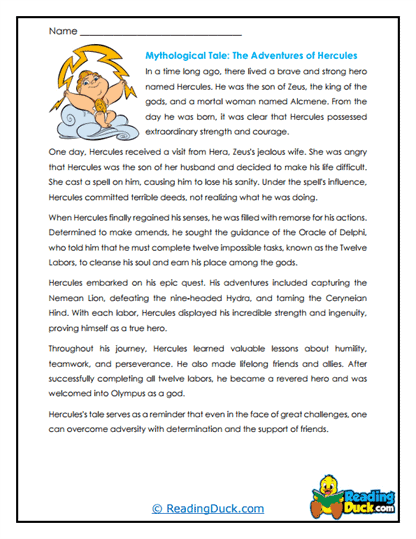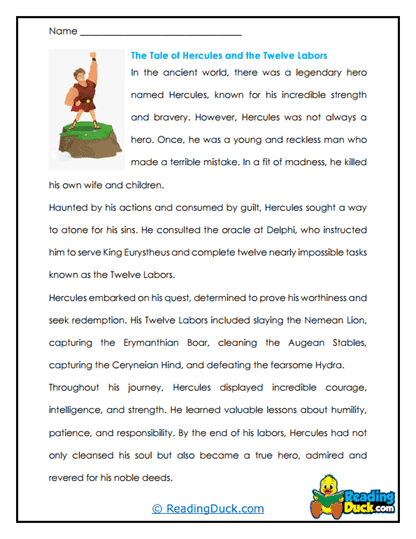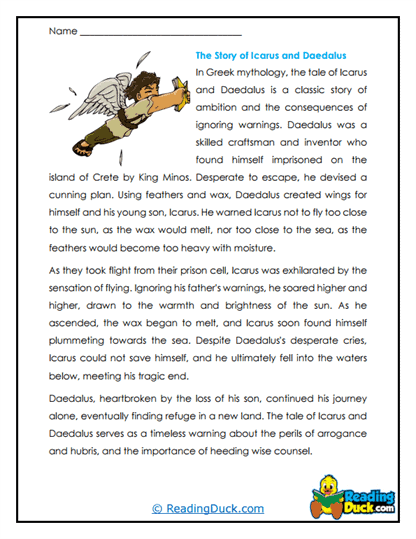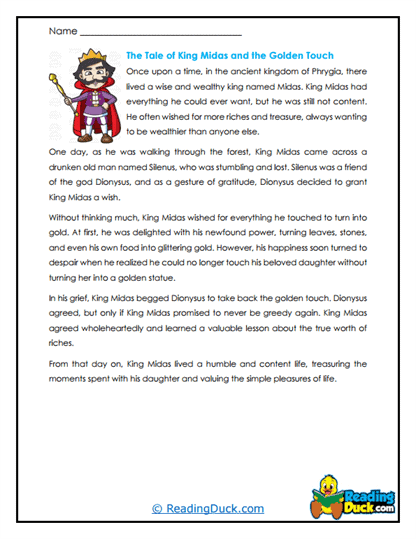Mythology Worksheets
About Our Mythology Worksheets
Our Mythology Worksheets offer students an exciting opportunity to explore ancient stories that have shaped cultures and literature for centuries. Each worksheet set contains a reading passage that draws from a wide range of mythological traditions—whether Greek, Roman, Norse, Egyptian, or beyond—accompanied by multiple-choice questions, short-answer prompts, and open-ended questions. These worksheets are designed to help students not only understand the stories themselves but also dive deeper into the themes, symbols, and characters that make mythology so compelling.
The worksheets are provided in a PDF format, ensuring easy access for download, viewing, and printing. Each set comes with a downloadable answer key, enabling quick and efficient grading for teachers and homeschooling parents. Our Mythology Worksheets are perfect for middle school and high school students, though they can be adapted for younger learners in upper elementary levels. Whether used in traditional classrooms, homeschooling environments, or for independent study, these worksheets make an excellent addition to any curriculum focused on fiction, mythology, or storytelling.
Delving into the World of Mythology
Mythology is a cornerstone of human storytelling and cultural heritage, offering explanations for the mysteries of the world, the origin of customs, and the dynamics of human nature. These ancient tales are filled with gods, heroes, and monsters, and often grapple with universal themes such as creation, destiny, conflict, morality, and the quest for meaning. Myths were the earliest form of narrative fiction, used to explain natural phenomena, human behavior, and the workings of the universe.
Some of the key themes and characteristics of mythology include:
- Creation and Origin Stories: Myths often explain the origins of the world, humankind, or specific elements of nature, such as the seasons, the sun, or the ocean.
- Heroic Journeys: The heroic quest is a central theme in many mythologies, where a hero embarks on a perilous journey to defeat monsters, overcome challenges, or discover profound truths.
- Gods and Divine Interventions: Gods and supernatural beings play pivotal roles in shaping the fates of mortals, often serving as protectors, adversaries, or manipulators.
- Moral Lessons: Many myths offer moral teachings or cautionary tales, illustrating the consequences of human actions, such as hubris, greed, or betrayal.
Mythology is essential to fiction because it laid the foundation for modern storytelling and continues to inspire writers across genres. From the epic journeys of Odysseus to the tragic fall of Icarus, these stories provide insight into the human condition and offer powerful metaphors for life's challenges. Through our worksheets, students can explore these timeless stories while developing their reading comprehension, critical thinking, and creative skills.
Building Essential Skills with Mythology
Our Mythology Worksheets go beyond just introducing students to legendary tales; they are structured to develop key academic skills that are critical for success in both literature and life. By working through these engaging texts, students will sharpen their ability to understand complex narratives, think critically about themes and symbolism, and express themselves creatively. Here’s how these worksheets build essential skills:
- Reading Comprehension: Multiple-choice questions help students grasp key details about the myth, such as identifying major events, understanding the motivations of gods or heroes, and recognizing symbols or recurring themes.
- Critical Thinking: Short-answer questions challenge students to dig deeper into the meaning behind the myths. They might be asked to explain the moral lesson of a story or interpret the symbolism behind a character’s actions.
- Creative Expression: Open-ended questions provide a platform for students to engage imaginatively with the text, encouraging them to write their own versions of myths, imagine alternate endings, or create new characters that fit within the mythological framework.
For instance, after reading a passage about Perseus slaying Medusa, students might answer multiple-choice questions to assess their understanding of the story’s events. Short-answer prompts might ask them to analyze the symbolism of Medusa’s petrifying gaze or discuss the themes of bravery and fate. Open-ended questions could challenge students to rewrite the ending, imagining how Perseus’ journey might change if he had failed or encountered different gods along the way. This combination of factual comprehension and creative engagement ensures a deep understanding of mythology while fostering personal expression.
Uncovering the Storytelling Techniques of Mythology
Mythological stories often rely on narrative techniques that are distinctive from modern fiction. The structure of myths reflects their origins as oral tales, and they are typically filled with symbolic elements, epic scale, and supernatural interventions. Our Mythology Worksheets encourage students to explore these storytelling techniques, helping them understand how myths convey universal truths, cultural values, and human experiences through symbolic and fantastical elements.
Key storytelling techniques in mythology include:
- Epic Structure: Many myths follow a grand, epic structure, where heroes face immense challenges, supernatural beings, and impossible odds. Students will analyze how this structure builds tension and creates a larger-than-life narrative.
- Symbolism and Allegory: Myths are rich in symbolism, with characters, events, and objects representing deeper meanings. Worksheets will challenge students to interpret these symbols—whether it’s the Golden Fleece in Greek mythology or Thor’s hammer in Norse myths.
- Moral Lessons and Cautionary Tales: Many myths are didactic, designed to teach moral lessons or warnings. Students will be prompted to identify the moral or cultural values that each myth imparts, such as the dangers of hubris in stories like Daedalus and Icarus.
For example, in a worksheet featuring a myth about Thor’s battle with the Frost Giants, students might be asked to explore the symbolic significance of Thor’s hammer as a representation of power and protection. Short-answer questions could prompt them to think about how Thor’s strength and courage embody the values of Norse culture. Open-ended prompts might ask them to write a new mythological story in which Thor faces a different supernatural threat, encouraging them to apply their understanding of mythological structures and themes in their own creative writing.
Developing Analytical and Creative Thinking Skills
Our Mythology Worksheets are designed to foster both creative thinking and analytical skills in students. By engaging with stories that are rich in symbolism, character complexity, and moral teachings, students will hone their ability to analyze plot developments, interpret themes, and evaluate character motivations.
Through these worksheets, students will:
- Interpret Symbolism and Themes: Myths are filled with symbolic elements that represent larger themes. Students will be asked to identify and analyze these symbols, whether it’s the labyrinth in Greek mythology as a symbol of inner confusion or the world tree Yggdrasil in Norse mythology as a symbol of cosmic order.
- Analyze Character Conflicts and Motivations: Students will explore how gods and heroes interact, understanding their motivations and how their decisions shape the outcome of the myth. Worksheets will encourage students to evaluate why certain characters act the way they do and how their actions impact the narrative.
- Create New Mythological Stories: Open-ended questions allow students to write their own mythological stories, encouraging them to think creatively about character development, conflict, and the lessons their myth would teach.
For instance, a worksheet based on the myth of Hercules and the Twelve Labors might prompt students to analyze the significance of each labor and what it symbolizes about Hercules’ growth as a hero. Open-ended questions could ask students to imagine a new labor for Hercules, giving them the chance to apply what they’ve learned about mythological themes and structure in a creative way.
Versatile Applications in Different Learning Environments
Our Mythology Worksheets are designed to be flexible, making them ideal for a wide range of educational settings. Whether used in traditional classroom lessons, homeschooling environments, or for independent study, these worksheets provide a structured way for students to engage with classic myths while honing important academic skills.
- In traditional classrooms, teachers can use these worksheets as part of units on mythology, storytelling techniques, or literary analysis.
- For homeschooling, the worksheets are easy to download and print, providing a valuable resource for structured learning that students can work through at their own pace.
- For independent study, students can use the worksheets to build their understanding of mythological narratives, developing both their analytical and creative skills.
The PDF format of these worksheets ensures that they are simple to integrate into various learning environments, while the answer keys provide teachers and parents with a quick way to assess students’ comprehension and analysis.
Supporting Independent and Collaborative Learning
These worksheets are designed to support both independent learning and group discussions, offering opportunities for students to analyze mythological themes, characters, and settings either individually or collaboratively. Whether working alone or in groups, students can explore the core ideas of mythology, discuss interpretations of ancient stories, and even create their own versions of mythological tales.
Overall, our Mythology Worksheets are a comprehensive resource that fosters active learning, enhances critical thinking, and encourages creative expression. They are an invaluable tool for teachers and students looking to explore the enduring power of mythological stories, helping students connect ancient myths to modern themes and develop a deeper understanding of fiction and storytelling.
